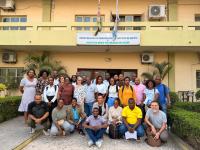The relation between the training of technicians and the strengthening of national health systems is the theme of RETS virtual meeting
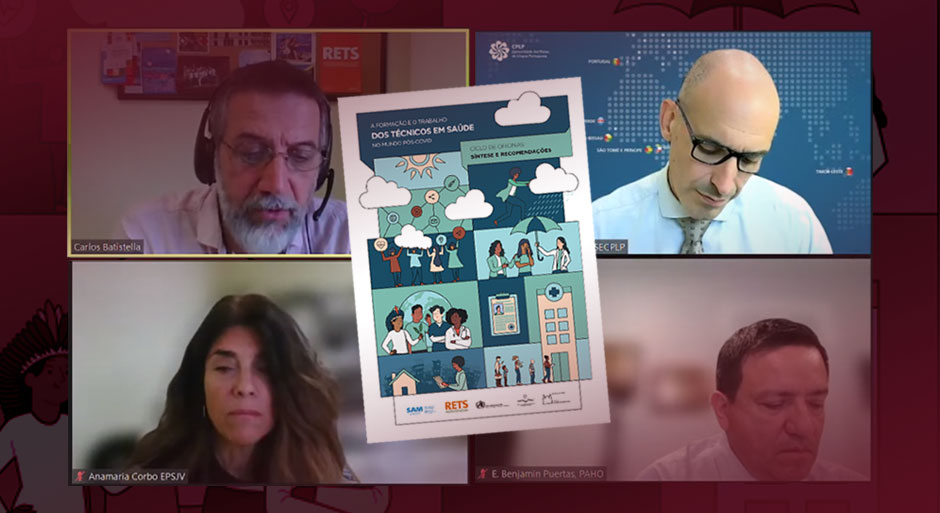
"Strengthening the training and work of health technicians is strengthening national health systems: the perspectives of PAHO/WHO and the CPLP". This was the central theme of the virtual meeting of the International Network for the Education of Health Technicians (RETS), based at the Joaquim Venâncio Polytechnic School of Health (EPSJV/Fiocruz). Held online on November 7, the event included the launch of an electronic publication, a debate, and a brief presentation on strategic projects.
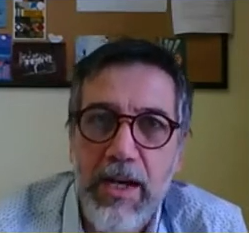 The meeting began with the official launch of the electronic publication "The training and work of health technicians in the post-Covid world: synthesis and recommendations", which brings together the knowledge and experiences accumulated in the cycle of workshops held in 2022, with the support of PAHO's Subregional Program for South America and Fiocruz's Center for International Relations in Health (CRIS). "Our idea was to create a privileged space for exchange, reflection, learning and the formulation of proposals on the concrete experiences of how different health technician training institutions face their challenges and seek to improve their performance," said the EPSJV's International Cooperation coordinator, Carlos Eduardo Batistella. The cycle of workshops was an initiative of the EPSJV, in cooperation with the International Network for the Education of Health Technicians (RETS), the Ibero-American Network for the Education of Health Technicians (RIETS) and the Network of Health Technical Schools of the Community of Portuguese-Speaking Countries (RETS-CPLP).
The meeting began with the official launch of the electronic publication "The training and work of health technicians in the post-Covid world: synthesis and recommendations", which brings together the knowledge and experiences accumulated in the cycle of workshops held in 2022, with the support of PAHO's Subregional Program for South America and Fiocruz's Center for International Relations in Health (CRIS). "Our idea was to create a privileged space for exchange, reflection, learning and the formulation of proposals on the concrete experiences of how different health technician training institutions face their challenges and seek to improve their performance," said the EPSJV's International Cooperation coordinator, Carlos Eduardo Batistella. The cycle of workshops was an initiative of the EPSJV, in cooperation with the International Network for the Education of Health Technicians (RETS), the Ibero-American Network for the Education of Health Technicians (RIETS) and the Network of Health Technical Schools of the Community of Portuguese-Speaking Countries (RETS-CPLP).
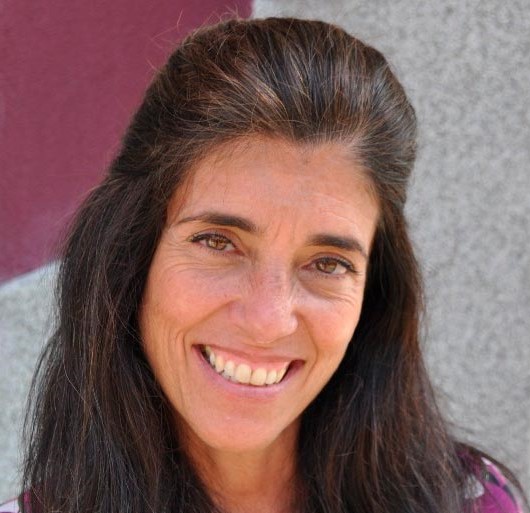 The director of the EPSJV, Anamaria Corbo, pointed out that this was a moment to reaffirm a commitment made by the School in conjunction with PAHO/WHO and to celebrate the strategic partnership with PAHO's Subregional Program for South America in holding the workshop cycles (2021 and 2022), as well as in other priority projects to strengthen the training of technical health workers. "With the participation of active members of the network, representatives of international organizations and a wide audience from various countries, we were able to bring together a considerable group of managers, researchers and health and education workers who were able to bring experiences and share new ways of dealing with health work and training in the context of the pandemic and in the post-covid period," he said. He concluded: "The publication brings materiality and perpetuity to the knowledge and experiences that were shared in this cycle. It demanded a lot of care and respect for what was presented and the utmost fidelity to what was said," said Anamaria.
The director of the EPSJV, Anamaria Corbo, pointed out that this was a moment to reaffirm a commitment made by the School in conjunction with PAHO/WHO and to celebrate the strategic partnership with PAHO's Subregional Program for South America in holding the workshop cycles (2021 and 2022), as well as in other priority projects to strengthen the training of technical health workers. "With the participation of active members of the network, representatives of international organizations and a wide audience from various countries, we were able to bring together a considerable group of managers, researchers and health and education workers who were able to bring experiences and share new ways of dealing with health work and training in the context of the pandemic and in the post-covid period," he said. He concluded: "The publication brings materiality and perpetuity to the knowledge and experiences that were shared in this cycle. It demanded a lot of care and respect for what was presented and the utmost fidelity to what was said," said Anamaria.
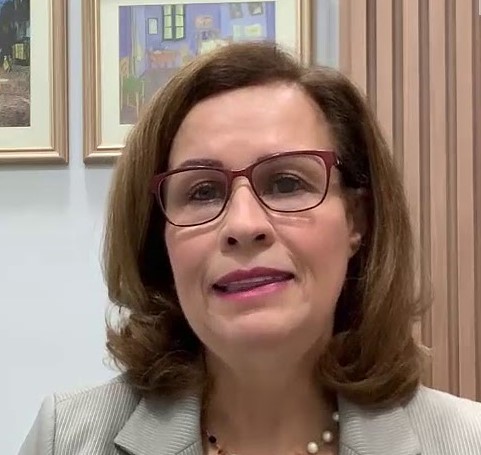 For Silvia Cassiani, regional advisor for Nursing and Health Technicians at the Pan American Health Organization (PAHO/WHO), the EPSJV has accumulated experience that puts it at the forefront of the discussion on the education of health technicians in this region. "The e-book makes it clear that resilient health systems require qualified workers who are involved in their planning, who have decision-making capacity and whose rights, safety and training are respected. The work of widely disseminating this publication, reaching out to governments, technical schools and other stakeholders is extremely important if we are to increase investment in the technicians who so desperately need and deserve it," he added.
For Silvia Cassiani, regional advisor for Nursing and Health Technicians at the Pan American Health Organization (PAHO/WHO), the EPSJV has accumulated experience that puts it at the forefront of the discussion on the education of health technicians in this region. "The e-book makes it clear that resilient health systems require qualified workers who are involved in their planning, who have decision-making capacity and whose rights, safety and training are respected. The work of widely disseminating this publication, reaching out to governments, technical schools and other stakeholders is extremely important if we are to increase investment in the technicians who so desperately need and deserve it," he added.
 Next, María Dolores Pérez Rosales, director of the PAHO Subregional Program for South America, reaffirmed the importance of the role of technicians in the work and formation of networks of interprofessional teams in primary care and commented on the relevance of the e-book. "We are sure that this publication will make a great contribution to knowledge about the training of health technicians. We know that technicians play a central role in the management of these teams, especially in improving access to primary care for the most vulnerable populations," she commented. He concluded: "We recognize the importance of the role of the Polytechnic School as a PAHO/WHO collaborating center for the education of health technicians and the partnership work we have developed. We still have a work agenda to continue strengthening the training of health technicians."
Next, María Dolores Pérez Rosales, director of the PAHO Subregional Program for South America, reaffirmed the importance of the role of technicians in the work and formation of networks of interprofessional teams in primary care and commented on the relevance of the e-book. "We are sure that this publication will make a great contribution to knowledge about the training of health technicians. We know that technicians play a central role in the management of these teams, especially in improving access to primary care for the most vulnerable populations," she commented. He concluded: "We recognize the importance of the role of the Polytechnic School as a PAHO/WHO collaborating center for the education of health technicians and the partnership work we have developed. We still have a work agenda to continue strengthening the training of health technicians."
PAHO/WHO and CPLP perspectives
Following the program, Eduardo Benjamín Puertas, head of the Human Resources for Health unit at the Pan American Health Organization (PAHO/WHO) and Manuel Clarote Lapão, director of Cooperation at the Community of Portuguese Language Countries (CPLP), presented the main points of two documents approved in 2023, respectively by PAHO/WHO and the CPLP: "Policy on the health workforce for 2030: strengthening human resources for health to achieve resilient health systems" and the "Strategic Plan for Cooperation in Health (PECS 2023-2027)".
Mediating the panel discussion, Carlos Eduardo Batistella recalled that in March 2023, the Ministers of Health of the Community of Portuguese Speaking Countries (CPLP) approved the Strategic Plan for Cooperation in Health (PECS 2023-2027), which highlights six areas of intervention to be prioritized, so that the countries of the Community can, in a coordinated and cooperative manner, continue to implement policies and strategies aimed at consolidating sustainable development, good governance of their national health systems and global health.
In September, according to the EPSJV's International Cooperation coordinator, it was the turn of the Pan American Health Organization (PAHO/WHO) Governing Council to endorse the "Policy on the Health Workforce for 2030: Strengthening human resources for health to achieve resilient health systems (Document CD60/6)", which proposes five strategic lines of action for strengthening human resources for health (HRH) and building stronger and more resilient health systems, capable of recovering the public health achievements affected by the pandemic and getting back on track towards meeting the Sustainable Development Goals (SDGs) by 2030.
"With all their peculiarities, the two documents emphasize the need to strengthen National Health Systems to achieve the SDGs and to prepare these systems to deal with new health emergencies. Another aspect common to both is the recognition that the adequate training of human resources for the sector and the improvement of their working conditions, as well as the centrality of Primary Health Care (PHC) in this process are fundamental," said Batistella.
Eduardo Benjamín Puertas highlighted some of the points of the "Policy on the Health Workforce for 2030: Strengthening Human Resources for Health to Achieve Resilient Health Systems". According to him, the context of the document is a global crisis that has been going on since at least 2014, related to the serious shortage and maldistribution of health professionals. "It is estimated that by 2023 we will have a deficit of 600,000 health professionals in Latin America and the Caribbean. If we make a more recent analysis, we would see that this deficit could reach 2 million human resources in health in the same region. There is growing recognition of the urgency of focusing not only on transforming health systems, but also on the need to invest in health workers," he said
According to the PAHO/WHO representative, there are many challenges in the area of human resources in relation to governance and leadership, education and training, access and quality, and HR information systems. "In terms of governance and leadership, there are, for example, limitations in terms of professional and academic regulation and ensuring the quality of professionals, as well as insufficient capacity for planning, forecasting and management, which was seen a lot during the pandemic, but which continues to be a major challenge," he said.
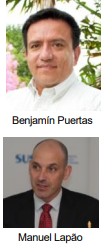 In the area of education and training, Eduardo pointed to the issue of ill-equipped or untrained human resources for people- and community-centered PHC, the fact that academic institutions are not aligned with national health systems, and the lack of investment in research. On access and quality, he cited inequalities in the availability and distribution of human resources, high rates of migration of these workers, persistent disparities in working conditions and wage differentials, especially for women; as well as the lack of psychosocial support and low attraction and retention of staff in rural and underserved areas. "Another outstanding challenge throughout the region is the need for better integrated information systems," he added.
In the area of education and training, Eduardo pointed to the issue of ill-equipped or untrained human resources for people- and community-centered PHC, the fact that academic institutions are not aligned with national health systems, and the lack of investment in research. On access and quality, he cited inequalities in the availability and distribution of human resources, high rates of migration of these workers, persistent disparities in working conditions and wage differentials, especially for women; as well as the lack of psychosocial support and low attraction and retention of staff in rural and underserved areas. "Another outstanding challenge throughout the region is the need for better integrated information systems," he added.
And what is PAHO/WHO's role in dealing with these challenges and future needs? Eduardo replied: "We have a series of resolutions and policies that have supported the countries' efforts. The most recent of these, 'Policy on the Health Workforce for 2030', was approved in September and has five strategic lines such as: strengthening governance and promoting national policies and plans; developing and consolidating regulatory mechanisms; strengthening the formation and integration of interprofessional teams, enhancing the development and capabilities of health professionals; as well as promoting decent working conditions and physical and mental protection for workers". According to him, this would be the way to strengthen human resources in the search for resilient health systems.
The CPLP's "Strategic Health Cooperation Plan (PECS 2023-2027)" was presented by Manuel Clarote Lapão. According to him, the PECS-CPLP was approved for the first time at the 2nd Meeting of CPLP Health Ministers (RMSCPLP) in 2009, with further editions in 2014, 2018 and the current one in March 2023. "The Plan represents a collective commitment to horizontal and structuring cooperation between the CPLP Member States in the health sector, an innovative, comprehensive and synergy-integrating mechanism, an instrument that has contributed to increasing multilateral action by the CPLP in terms of sharing experiences, networking initiatives, developing partnerships and promoting collective, short-, medium- and long-term responses to combat public health emergencies and achieve all the goals of the Sustainable Development Goals (SDGs)," he said.
According to Manuel, the PECS 2023-2027 reaffirms the political will of the CPLP Member States to pursue, in a coordinated and cooperative manner, the implementation of policies and strategies aimed at consolidating sustainable development, good governance of their national health systems and global health. "As specific objectives, we will seek to guide CPLP health cooperation; foster the Community's relationship with different development partners in the health sector; strengthen the capacity for dialogue and leadership of the PECS-CPLP operationalization structures, and improve the efficiency and effectiveness of Member States' national health systems," he added.
The CPLP representative also presented the six axes of intervention, which he said were: (1) National Health Systems (NHS); (2) Training and Development of the Health Workforce (FTS); (3) Health Information and Communication (HCI); (4) Health Research and Bioethics; (5) Monitoring the SDGs; and (6) Public Health Emergency Preparedness. From this, Manuel highlighted the results expected from the Plan: "We expect a clearly defined CPLP health cooperation, with a Community relationship with different development partners in the health sector fostered and increased; with a strengthened capacity for dialogue and leadership of the PECS-CPLP operationalization structures; and an improved efficiency and effectiveness of the national health systems of the Member States."
Strategic projects
 Finally, the two strategic projects that represent the effort to coordinate the networks (RIETS, RETS and RETS-CPLP) in order to qualify interventions in the field of health technician training were presented: the Mapping of technical workers working in PHC in South American countries, drawn up to respond to an internal call for proposals from the EPSJV; and the Seminar on Clinical Simulation in the Training of Health Technicians: challenges and prospects, presented to the Ibero-American General Secretariat (Segib) as part of the 1st Call for Projects for Networks entered in the Register of Ibero-American Networks. The project was approved in July 2023, reinforcing the decision, expressed in the 3rd Quadrennial Action Plan for Ibero-American Cooperation 2023-2026, to incorporate health as a new field of action, including articulation and coordination with the different initiatives in this field in the region.
Finally, the two strategic projects that represent the effort to coordinate the networks (RIETS, RETS and RETS-CPLP) in order to qualify interventions in the field of health technician training were presented: the Mapping of technical workers working in PHC in South American countries, drawn up to respond to an internal call for proposals from the EPSJV; and the Seminar on Clinical Simulation in the Training of Health Technicians: challenges and prospects, presented to the Ibero-American General Secretariat (Segib) as part of the 1st Call for Projects for Networks entered in the Register of Ibero-American Networks. The project was approved in July 2023, reinforcing the decision, expressed in the 3rd Quadrennial Action Plan for Ibero-American Cooperation 2023-2026, to incorporate health as a new field of action, including articulation and coordination with the different initiatives in this field in the region.
"These initiatives don't exhaust the possibilities for cooperation that we can make within the networks, but they do tie in with some of the proposals and challenges that have been put forward here today. One of them concerns thinking about training processes that take interprofessional training into account, and the proposal for the Simulation Seminar moves in this direction. And the other concerns the need, in order to be able to think about and subsidize a public policy, to base ourselves on information about the situation that this policy intends to respond to. In this sense, the mapping provides fundamental information so that, based on these results, we can inflect public policies for the region," said the director of EPSJV/Fiocruz.
Regarding the Seminar on Clinical Simulation in the Training of Health Technicians, Batistella said it will take place on December 4 and 5, 2023, at the Polytechnic School, with exhibitors and guests from different institutions and countries, with panel discussions and workshops. The first day will be open to public, and the second will be invitation only. "At the end, we hope to have a document that is like a call to action, identifying the areas and professional categories whose training could benefit from the inclusion of simulation as a teaching-learning strategy; institutions that have already incorporated clinical simulation and simulation experiences in PHC," he said.
 Finally, EPSJV professor-researcher Isabella Koster presented the "Mapping of technical workers who work in PHC in South America" which, she said, aims to contribute to strengthening research by producing and disseminating its results in a shared way and line with the needs of practices and knowledge in Professional Health Education. "To this end, it aims to integrate laboratories and sectors of the EPSJV and has scientific dissemination as a contribution, so that research is not just academic fruit, but can be articulated and be part of the decision-making field," she explained.
Finally, EPSJV professor-researcher Isabella Koster presented the "Mapping of technical workers who work in PHC in South America" which, she said, aims to contribute to strengthening research by producing and disseminating its results in a shared way and line with the needs of practices and knowledge in Professional Health Education. "To this end, it aims to integrate laboratories and sectors of the EPSJV and has scientific dissemination as a contribution, so that research is not just academic fruit, but can be articulated and be part of the decision-making field," she explained.
One of the mapping hypotheses, according to Isabella, is that there is a great diversity of technical health workers among Latin American countries, who even though they represent the largest portion of the health workforce, there is still invisibility and a lack of knowledge about who they are, what they do and where they work. "At the same time, there are similarities and differences between technicians in these countries. By analyzing and promoting dissemination strategies articulated between potential interlocutors in the field of international cooperation, this could lead to the strengthening of the development of these professional categories and, consequently, of PHC," Isabella said.
The professor-researcher also pointed out some of the objectives of the mapping, such as analyzing the historical and political-institutional aspects that shape the organization of PHC in each country; identifying the professional categories, training, duties and practices, forms of employment and degree of institutionalization of these workers; describing the general characteristics of the organization of the work of PHC technicians in the countries; identify the main regulations that define the context in which they work and regulate the work and education of health technicians in PHC; mobilize strategic research partners to strengthen the capacity for collaborative work and the production of shared knowledge, as well as to disseminate the products and results achieved. "Methodologically, it is a qualitative and exploratory study, which included South American countries that speak Spanish and Portuguese and have a history of partnership with RETS, such as Argentina, Bolivia, Brazil, Chile, Colombia, Ecuador, Paraguay, Peru, Uruguay and Venezuela," she said.
Finally, Isabella outlined the expected results of the mapping. "We hope that the results of this study will boost the capacity for collaborative work and the production of shared knowledge on cooperation and regional integration in South America," she said.
Watch the full virtual meeting: https://www.youtube.com/watch?v=9JmfOWQBkvw



